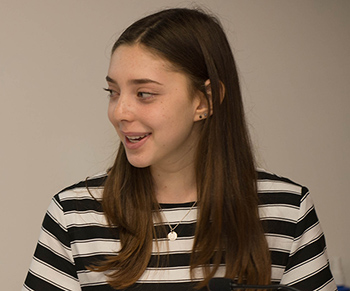
Lucy Fried
For Lucy Fried, storytelling is the best way to make an impact. The high school sophomore is a Junior Intern with USC Shoah Foundation, and as such, has spent one day every month for the past five months listening to testimony from the Institute’s Visual History Archive – to the stories and memories of Holocaust and genocide survivors.
One of several Junior Interns, Fried spends her time at the Institute drawing from these stories in discussions with other students about what attitudes breed hatred and intolerance, how she and her fellow interns can spread positive moral authority and how they can become active participants in civil society.
Initially interested in becoming a Junior Intern because of her own interest in Holocaust education, Fried quickly realized her own power in spreading the information she was learning.
“I understand that my generation has the power and responsibility to be educated and also to educate other about genocide,” Fried said. “Throughout my time as a Junior Intern, I have gained knowledge to my life in a meaningful way. I have also gained more of an understanding of my responsibility as a young adult to be a part of the solution in creating a more tolerant world, and ensuring people remain educated and informed.”
To help get the Junior Interns educated, the USC Shoah Foundation Education Department sets out several objectives for their meetings and discussions. The Junior Interns study the different types of memory – personal, collective and cultural – that lend themselves to remembering genocide events; cultivate digital and media literacy skills and apply them to their IWitness activities as they watch and learn from the Visual History Archive testimonies; consider what connects people as human beings, and what causes such disconnects as those that lead to violence and genocide.
“At Junior Intern meetings, we discuss the causes of intolerance and hatred and analyze their dangerously easy abilities to evolve into genocide,” Fried said. “We do all of this learning through testimony, engaging group conversation and meaningful art projects and activities.”
Although Fried came into the program with a working knowledge of the Holocaust, connected to it familially through her grandparents, watching additional testimonies has impacted her still more.
“Watching testimony has made the memory of the Holocaust even more personal,” Fried said. “It has truly reinforced the importance of ‘never forgetting’ the devastating events, and has made me think more critically and thoughtfully about the ways that I act toward others.”
Over these past few months, Junior Interns have had the chance to visit, either physically or virtually, museums and authentic sites of genocide testimonies, and to contribute to the work of the Institute through their own research. In the upcoming months, they’ll craft and deliver presentations on what they’ve learned, continue to interact with Institute staff and have ample opportunity to make social impact and work with people of diverse backgrounds and cultures with the interpersonal communication skills they will have learned throughout the program.
“The Junior Intern program will definitely have a lasting impact on my life, as I now feel more empowered to stand up for those being put down or bullied,” Fried said. “I also now feel that I have a role in educating others, to ensure a more tolerant and understanding future.”
Fried’s aspirations of studying nonprofit work and creative writing in university will no doubt be helped by her experiences at USC Shoah Foundation.
Once she and the other Junior Interns complete their work at the Institute, they will receive certificate and community service hours, and be extended the option to continue engaging with the Institute as program assistants or Student Ambassadors.
To keep up with the interns’ work, check out the hashtag #IWitnessJrIntern.